
NGC 6946, sometimes referred to as the Fireworks Galaxy, is a face-on intermediate spiral galaxy with a small bright nucleus, whose location in the sky straddles the boundary between the northern constellations of Cepheus and Cygnus. Its distance from Earth is about 25.2 million light-years or 7.72 megaparsecs, similar to the distance of M101 in the constellation Ursa Major. Both were once considered to be part of the Local Group, but are now known to be among the dozen bright spiral galaxies near the Milky Way but beyond the confines of the Local Group. NGC 6946 lies within the Virgo Supercluster.

NGC 16 is a lenticular galaxy located in the Pegasus constellation. It was discovered on September 8, 1784, by William Herschel.
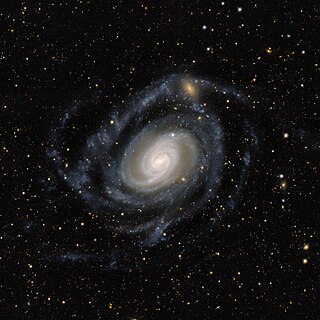
NGC 289 is a spiral galaxy in the southern constellation of Sculptor, located at a distance of 76 megalight-years from the Milky Way. It was discovered on September 27, 1834, by John Herschel. The compiler of the New General Catalogue, John Louis Emil Dreyer, noted that NGC 289 was "pretty bright, large, extended, between 2 considerably bright stars". The plane of the galaxy is inclined by an angle of 45° to the line of sight from the Earth.
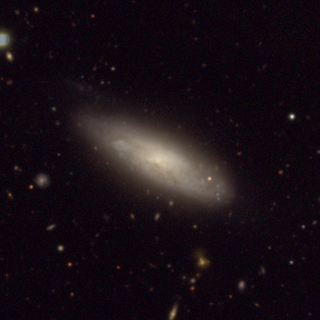
NGC 131 is a spiral galaxy that was discovered on September 25, 1834, by John Herschel. This galaxy belongs in the NGC 134 group of galaxies: NGC 115, NGC 148, NGC 150, PGC 2000, IC 1555, and PGC 2044.

NGC 322 is a lenticular galaxy located approximately 318 million light-years from the Solar System in the constellation Phoenix. It was discovered on September 5, 1834 by John Herschel. It was described by Dreyer as "very faint, very small, round, a little brighter middle, 3 stars to west." It apparently seems to be interacting with PGC 95427, another galaxy.
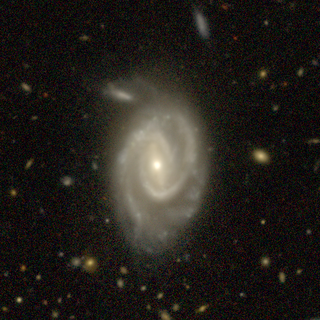
NGC 334 is a barred spiral galaxy in the constellation Sculptor. It was discovered on September 25, 1834 by John Herschel. It was described by Dreyer as "very faint, small, round, gradually a little brighter middle, 2 stars of 11th magnitude to south."
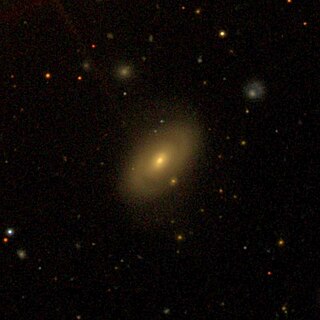
NGC 345 is a spiral galaxy located in the constellation Cetus. It was discovered on September 27, 1864 by Albert Marth. It was described by Dreyer as "very faint, very small, gradually brighter middle."

NGC 357 is a barred lenticular or spiral galaxy in the constellation Cetus. It was discovered on September 10, 1785, by William Herschel. It was described by Dreyer as "faint, small, irregularly round, suddenly brighter middle, 14th magnitude star 20 arcsec to northeast."

NGC 375 is an elliptical galaxy located in the constellation Pisces. It was discovered on September 12, 1784 by William Herschel. It was described by Dreyer as "pretty faint, small, round, brighter middle." Along with galaxies NGC 379, NGC 380, NGC 382, NGC 383, NGC 384, NGC 385, NGC 386, NGC 387 and NGC 388, NGC 375 forms a galaxy cluster called Arp 331.

NGC 380 is an elliptical galaxy located in the constellation Pisces. It was discovered on September 12, 1784 by William Herschel. It was described by Dreyer as "pretty faint, small, round, suddenly brighter middle." Along with galaxies NGC 375, NGC 379, NGC 382, NGC 383, NGC 384, NGC 385, NGC 386, NGC 387 and NGC 388, NGC 380 forms a galaxy cluster called Arp 331.

NGC 392 is a lenticular galaxy located in the constellation Pisces. It was discovered on September 12, 1784, by William Herschel. It was described by Dreyer as "faint, very small, round, much brighter middle, between 2 stars."

NGC 410 is an elliptical galaxy located in the constellation Pisces. It was discovered on September 12, 1784 by William Herschel. It was described by Dreyer as "pretty bright, pretty large, northeastern of 2.", the other being NGC 407.

NGC 418 is a barred spiral galaxy of type SB(s)c located in the constellation Sculptor. It was discovered on September 28, 1834 by John Herschel. It was described by Dreyer as "faint, pretty large, round, very gradually a little brighter middle, western of 2.", the other being NGC 423.

NGC 419 is a globular cluster located approximately 57,000 pc (190,000 ly) from Earth in the constellation Tucana. It was discovered on September 2, 1826, by James Dunlop. It was described by Dreyer as "pretty large, pretty bright, round, gradually brighter middle". At a distance of about 186,000 light years, it is located within the Small Magellanic Cloud. At an aperture of 50 arcseconds, its apparent V-band magnitude is 10.30, but at this wavelength, it has 0.15 magnitudes of interstellar extinction.

NGC 434 is an intermediate spiral galaxy of type SAB(s)ab located in the constellation Tucana. It was discovered on October 28, 1834 by John Herschel. It was described by Dreyer as "bright, small, round, pretty suddenly bright middle."
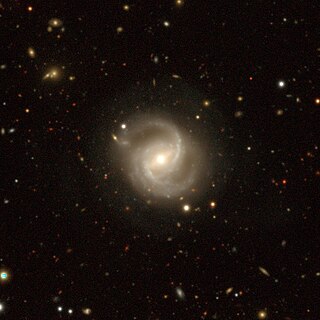
NGC 438 is an intermediate spiral galaxy of type (R')SAB(s)b: located in the constellation Sculptor. It was discovered on September 1, 1834, by John Herschel. It was described by Dreyer as "pretty faint, small, round, gradually a little brighter middle."

NGC 461 is an intermediate spiral galaxy of type SAB(s)c located in the constellation Sculptor. It was discovered on September 25, 1834 by John Herschel. It was described by Dreyer as "pretty bright, round, gradually a little brighter middle ."

NGC 779 is a spiral galaxy seen edge-on, located in the constellation Cetus. It is located at a distance of circa 60 million light years from Earth, which, given its apparent dimensions, means that NGC 779 is about 70,000 light years across. It was discovered by William Herschel on September 10, 1785.

NGC 765 is an intermediate spiral galaxy located in the constellation Aries. It is located at a distance of circa 220 million light years from Earth, which, given its apparent dimensions, means that NGC 765 is about 195,000 light years across. It was discovered by Albert Marth on October 8, 1864. The galaxy has an extensive hydrogen (HI) disk with low surface brightness, whose diameter is estimated to be 240 kpc.

NGC 5641 is a type Sb-barred spiral galaxy in the constellation of Boötes, registered in New General Catalogue (NGC). It is located five degrees east of NGC 5466.




















